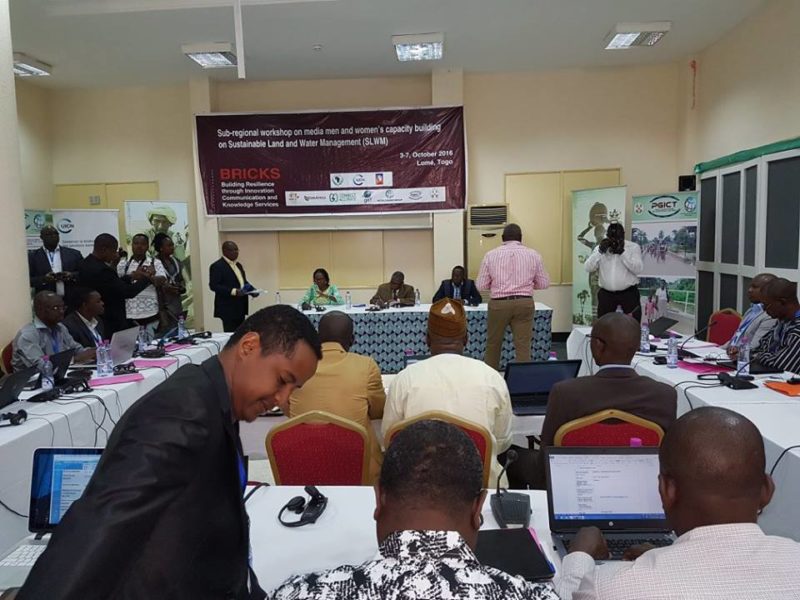The Central and West Africa Programme of the International Union for the Conservation of Nature (IUCN-PACO) workshop for media and communication experts on Sustainable Land and Water Management (SLWM) practices kicked-off on Monday in Lome, Togo with participants from 12 countries of the of the Building Resilience through Innovation, Communication and Knowledge Services (BRICKS) Sahel and West Africa Programme advocating for a more robust collaboration.

The participants also called for support and a network to enable progress through knowledge management on best practices in communication and its tools across the West Africa and the Sahel region.
Speaking at the opening ceremony, Ms. Bora Masumbimko of the IUCN described the regional capacity building workshop of media men and women, and notably the new generation of professionals, on the theme of land and water management, as being “in line with the implementation of the BRICKS project.” The workshop, she adds, will allow the involvement of media men and women in the efforts towards fighting against land and water degradation and more specifically promoting successful conservation approaches through their wider dissemination.
The Togolese Minister of Environment and Forest Resources, represented by Mr. Djutonou Folly, the Forestry Director in the Ministry, welcomed the participants and acknowledged that media men and women, who constitute major relays in communication mechanisms, are sometimes the only source of not only information, but also education for many people.
“It is therefore crucial to make sure that they are trained, informed and sensitised on natural resource conservation in general and SLWM in particular, so that they can fully play their role,” he states.
Organised in collaboration with the Permanent Inter-State Committee for Drought Control in the Sahel (CILSS), the Sahel Observatory (OSS) and the World Bank, the workshop is part of the implementation the BRICKS project to support the Great Green Wall Initiative for the Sahara and Sahel (GGWISS), a project aimed at planting a wall of trees across Africa at the southern edge of the Sahara Desert as a means to prevent desertification.
The five-day workshop, which has “Sustainable land and water management in SAWAP countries: Issues, challenges and local strategies” as its theme will, according to the organisers, allow the involvement of the media practitioners in the efforts towards fighting land and water degradation and more specifically promoting successful conservation approaches through their wider dissemination.
The workshop is also expected to outline IEC tools that will function well at the grassroots level (local level), while also providing correct and documented information on the causes, consequences, eco-citizen behaviors to be adopted in order to prevent land and water degradation and specifically promote existing conservation approaches.
The Lome forum will likewise provide an opportunity for producing a video on the “Ambassadors” of the Integrated Disaster and Land Management Project (IDLMP) for the Frogleaps site.
The BRICKS project is a six-year regional knowledge and monitoring hub for a $1.1 billion regional programme of 12 World Bank financed country operations plus related partner-supported activities that together contribute to the region’s and clients’ GGWISS priorities. BRICKS is implemented by three regional organisations recognised as centres of excellence: the CILSS, OSS and IUCN-PACO.
These organisations facilitate technical knowledge exchanges and monitoring services among the 12-country investment operations in the broader World Bank/GEF Sahel and West Africa Programme (SAWAP). Each organisation is responsible for implementing discrete activities related to resilient and carbon-smart natural resources management in the Sahel and West Africa region, focusing on biodiversity, crop, range, forest, water resources, and disaster risk management in arid, sub-humid and humid landscapes.
BRICKS was approved by the World Bank Board on September 4, 2013 and the Grant Agreements were signed at a ceremony with the leadership of the respective three Implementing Agencies (CILSS, OSS, and IUCN) on October 15, 2013 in Washington DC. The Project was declared effective on November 26, 2013.
The 12 countries are: Benin, Burkina Faso, Chad, Ethiopia, Ghana, Mali, Mauritania, Niger, Nigeria, Senegal, Sudan and Togo.

I want to be a partner